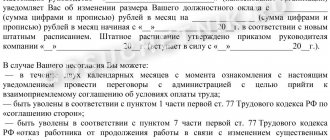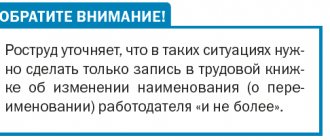General grounds for termination of an employment contract
The Labor Code of the Russian Federation (Article 77) defines the following reasons for termination of an employment agreement:
- joint decision of the parties;
- cancellation of the contract by decision of one of the parties;
- expiration of the valid contract period;
- the worker’s reluctance to work with another owner of the company if the owner of the organization has changed;
- employee refusal to work under the amended contract;
- termination of the production organization's activities;
- change of personnel's job responsibilities.
Termination of an employment agreement at the initiative of the employer
- Reasons beyond the control of employees:
- termination of the enterprise's activities;
- reducing the number of employees as an anti-crisis measure.
- Reasons associated with low qualifications of employees:
- insufficient professional qualifications of the employee for the position held, identified during certification.
However, prior to the certification, management must notify employees in writing about the upcoming event so that employees have the opportunity to prepare for the exam. Certification should be carried out in relation to all employees, and not individual personnel. In addition, if several attempts at certification were unsuccessful for an employee, the employer is obliged to offer him other vacant positions (Article 81 of the Labor Code of the Russian Federation).
- Reasons associated with non-compliance with internal rules of the organization:
- the employee ignoring his obligations under the contract;
- gross violation by an employee of official duties or professional ethics;
- disclosure of state, commercial, industrial secrets;
- causing damage to the property of the enterprise (theft, damage to property, misuse of funds), established during an internal investigation and confirmed in court;
- violation by an employee of labor protection rules;
- loss of trust in the employee (if he works with material and monetary values);
- employee decisions that caused material damage to the company;
- falsification of documents - both those that were submitted upon hiring and those that were drawn up during the period of employment.
The legislative framework
Every Russian citizen is free to choose his job and change it as often as he needs. This right is guaranteed by Article 37 of the Constitution. Termination of an employment contract at the initiative of an employee is regulated by Article 80 of the Labor Code of the Russian Federation.
The employee can do this at any time, but he must notify management at least two weeks in advance. In some cases, processing can be avoided:
- upon retirement;
- subject to the start of studies;
- upon urgent departure to another city;
- during pregnancy (if there is still a long time before going on maternity leave);
- if necessary, care for a sick relative;
- for health;
- in case of violation of labor law standards by the employer.
Such grounds for termination of an employment contract at the employee’s initiative oblige the management to release him from the desired date. Seasonal workers and newcomers undergoing a probationary period can be notified to the company three days in advance.
Dismissal due to disciplinary action
It is not always the case that if an employee violates internal regulations, the employment relationship with him can be terminated immediately.
Article 81 of the Labor Code of the Russian Federation determines that dismissal due to non-compliance with labor discipline is possible after a serious misconduct by an employee. If an employee already has such forms of disciplinary action as a reprimand or reprimand, and again commits a similar act in the workplace, the company management has the right to dismiss him.
Due to a single violation of discipline, other than absenteeism, a subordinate cannot be fired. It is worth understanding that if a former employee goes to court, which assesses the consequences of his actions for the company as insignificant, the dismissal will be postponed until the next similar violation of discipline.
Results
The grounds and procedure for dismissing employees by order of the employer must clearly comply with the letter of the law. If the employer does not take into account all the nuances specified in labor legislation, the employee will be able to challenge his dismissal in court. The result of such a trial will be reinstatement, payment of lost wages and penalties.
Employers must ensure that there is sufficient evidence to prove an employee's guilt if he is fired due to misconduct, negligence or breach of duty.
You can find more complete information on the topic in ConsultantPlus. Free trial access to the system for 2 days.
What disciplinary offenses still constitute a reason for dismissal?
- repeated violations of discipline - each such violation must be documented;
- absenteeism – absence from work for more than 4 hours without a confirmed valid reason;
- being drunk at work;
- theft in the workplace, as determined by an audit;
- immoral behavior of an employee - if the scope of his activity is related to educational or teaching work.
All employee responsibilities must be specified in a contract or internal document of the organization, for example, working hours, dress code, as well as company rules, with reference to legislative acts. Anything that is not recorded in writing cannot become a reason for dismissal.
For example, an employee’s failure to perform work or its unsatisfactory result cannot be considered a violation if their performance is not specified in the employment agreement or does not correspond to the worker’s professional qualifications.
Only a detailed job description can help the employer prove that the employee did not fulfill his duties.
Dismissal is lawful if:
- its reason complies with the norms of the Labor Code of the Russian Federation;
- all procedures for documenting dismissal were followed.
Procedure for termination of employment relations
If the reason for dismissal is legal and the procedure is not followed, then such dismissal can be overturned by the court. Then the company will have to reinstate the employee and fire him according to the rules, which means that he will have to pay for forced absences.
The correct thing to do is:
- issue an appropriate order;
- familiarize the employee with it;
- obtain a signature confirming familiarization with the document or draw up an act of refusal to familiarize yourself with it;
- make sure that the date of the last working day coincides with the day of dismissal;
- on the last working day, issue a work book to the subordinate with the appropriate mark;
- issue a settlement;
- if an employee refuses to pick up documents, then send a notice to the former employee about the need to pick them up.
Termination of TD due to the fault of an employee
When dismissing an employee due to failure to fulfill his job duties, a certain algorithm must be followed.
- The offense is recorded in writing.
- The culprit provides an explanation or refuses to report the reasons that prompted him to commit the violation. In the latter case, it is necessary to draw up an act.
- The results of consideration of the explanatory note, data on the presence of existing disciplinary sanctions, proposals on the degree of guilt of the employee are transmitted to management.
- Based on the information received, authorized persons make a decision on the application of penalties or dismissal. It is conveyed to the employee in the form of an order.
- If we are talking about termination of the contract, the dismissed person receives a calculation, a work book and a salary certificate for the last two years.
Still have questions?
Fill out the form and our expert will contact you!
Dismissal by court decision
- A number of disciplinary violations are associated not only with his dismissal, but also with imprisonment: causing harm, theft, misappropriation of funds. The dismissal procedure in such a situation is directly related to the court decision. In this case, the company must undergo an internal audit and, on its basis, the fact of a crime is established - and the guilt of the subordinate will be determined by the court.
- Another point is that not only bringing an employee to criminal liability is a reason for dismissal, but also a court prohibition from engaging in a certain type of professional activity.
If the dismissal depends on a court decision, then in this case you need to wait for the verdict to enter into legal force - the period for appeal is 10 days. Thus, the order of dismissal must be dated on the day the court decision entered into force.
How to quit without working
If the application (intentionally or by mistake) indicates an earlier dismissal date than 2 weeks later, the employer himself does not have the right to change it. And he cannot reduce the period of service established by law by his own willful decision. In this case, the parties are forced to negotiate.
Unauthorized absence from work is not in the employee’s interests. This threatens him with dismissal for absenteeism. At the same time, he cannot be fired later, after 2 weeks, since the application indicates a different date.
If the manager, when affixing the visa, writes: “I don’t mind,” this will confirm the agreement of the parties. In a situation where the administration is not ready to meet halfway and insists on working out, this decision should be communicated to the employee in writing, asked to rewrite the application and indicate the date required by law.
Dismissal due to failure to complete the probationary period
Even during the probationary period, an employment contract with a mark of completion of the test must be concluded with the specialist. The dismissal order must be issued before the end of the probationary period. It is mandatory to notify the employee no later than three days before the end of the internship. The reasons for failure to pass the test are communicated to the employee in writing.
Even the next day after the end of the probationary period, it is no longer possible to dismiss an employee for failure to complete it, so a decision should be made to dismiss or hire the employee during the probationary period.
There are no legislatively established indicators by which the manager determines the success or failure of passing the test. The manager determines these indicators independently.
Grounds for dismissing an employee
Dismissal during the probationary period
Which article of the Labor Code should you refer to: Art. 71 Labor Code of the Russian Federation.
The establishment of a probationary period when hiring is regulated by Art. 70 TK. It provides a list of employees for whom a probationary period is not established:
- persons elected through a competition to fill the relevant position, conducted in the manner established by labor legislation and other regulatory legal acts containing labor law norms;
- pregnant women and women with children under the age of one and a half years;
- persons under the age of 18;
- persons who have received secondary vocational education or higher education in state-accredited educational programs and are entering work for the first time in the acquired specialty within one year from the date of receiving vocational education at the appropriate level;
- persons elected to an elective position for paid work;
- persons invited to work by way of transfer from another employer as agreed between the employers;
- persons concluding an employment contract for a period of up to two months;
- to other persons in cases provided for by the Labor Code, other federal laws, and a collective agreement.
The probationary period cannot exceed three months, and for heads of organizations and their deputies, chief accountants and their deputies, heads of branches, representative offices or other separate structural divisions of organizations - six months, unless otherwise established by federal law.
During the probationary period, HR officers must record any deviations in the work of the new employee using memos and reports. When the probationary period ends and the employer evaluates the newcomer’s performance as unsatisfactory, he must document the validity of his decision.
The employer may terminate the employment contract before the expiration of the probationary period if the result is unsatisfactory, but he will need to notify the employee in writing (in notification format) no later than three days in advance, indicating the reasons that served as the basis for making such a decision. At the same time, you need to be prepared for the fact that the employee has the right to appeal this decision in court.
If an employee refuses to sign a notice, a corresponding act is drawn up, which records the fact that the employee has read the notice and refused to sign it. Based on the notification, order T-8 is issued to terminate the employment contract. If an employee refuses to sign an order, then at the bottom of the order the personnel officer writes by hand that the employee was familiar with the order, but refused to sign, or a corresponding act is drawn up. In any case, it is important to record the fact that the employee has read the order.
An employee can also terminate an employment contract at his own request during a probationary period. To do this, he needs to submit an application, but he does not have to indicate the reason for dismissal. The notice period in this case, according to Art. 71 TK, will be three calendar days. The dismissal itself is made on the basis of clause 3, part 1, art. 77 Labor Code (termination of an employment contract at the initiative of the employee).
Dismissal at your own request
Which article of the Labor Code should you refer to: Art. 80 Labor Code of the Russian Federation.
An employee has the right to terminate an employment contract at his own request, but he must notify the employer in writing no later than two weeks in advance, unless a different period is established by the Labor Code or other federal law. The specified period begins the next day after the employer receives the employee’s resignation letter. By agreement of the parties, this period may be reduced.
In cases where dismissal at the initiative of the employee is due to the impossibility of continuing his work, the date of dismissal can be set independently. In Art. 80 of the Labor Code contains the grounds when this option is possible: enrollment in an educational institution, retirement, established violation of labor legislation by the employer, etc. Labor relations practice shows that there are many more reasons for reducing notice periods. For example, an illness that prevents the continuation of this work, provided there is an appropriate medical report; moving to another area (clause 7.2 of the Resolution of the USSR State Committee on Labor and Social Issues dated October 25, 1983 No. 240/22-31).
The list of valid reasons for dismissal on the day the application is submitted can be enshrined in the internal labor regulations of the organization or in the collective agreement.
Before the expiration of the notice period for dismissal, the employee has the right to withdraw his application at any time. Dismissal in this case is not carried out unless another employee is invited in his place in writing, who, in accordance with the Labor Code and other federal laws, cannot be denied an employment contract. For example, in Art. 64 of the Labor Code states that it is prohibited to refuse to conclude an employment contract to employees invited in writing to work as a transfer from another employer.
Upon expiration of the notice period for dismissal, the employee has the right to stop working. On the last day of work, the employer must:
- issue the employee with a work book;
- issue other work-related documents upon written request from the employee;
- make a settlement with him.
How to prepare documents?
When an employee has the right to reduce the notice period, he writes a dismissal date, which is binding on the employer, that is, he cannot unilaterally change this date on his own. Sometimes an employee is not entitled to benefits, but asks to be fired early. For example, he writes a statement on May 15, and asks to fire him on May 19. In this case, the employer can act under Art. 80 TK. If he agrees to dismiss earlier, he accepts the application and issues an order. If he does not agree, then he draws up a notice for the employee, in which he explains that he cannot accept such a statement on the basis of Art. 80, which requires two weeks notice and asks to write a new application.
Next, order T-8 is issued, the employee reads it and signs it. Together with the order, a note-calculation form T 61 is prepared for the accounting department.
Based on the order, an entry is made in the work book (this is done on the last day before the book is issued, so that the employee immediately signs in the book for recording the movement of work books).
Dismissal by agreement of the parties
Which article of the Labor Code should you refer to: Art. 78 Labor Code of the Russian Federation.
The basis for dismissal “by agreement of the parties” was included in the Labor Code in 2006, and Art. 78 of the Labor Code, which is devoted to this issue, contains only one sentence: “An employment contract can be terminated at any time by agreement of the parties to the employment contract.” No matter how such a basis for dismissal is perceived, one must proceed, first of all, from the fact that the word “agreement” itself indicates a peaceful basis for termination of the employment relationship.
Despite the fact that the agreement is not provided for by the Labor Code, it is a very important document, since it specifies the conditions under which the parties terminate the employment relationship.
Dismissal due to expiration of the employment contract
Which article of the Labor Code should you refer to: Art. 79 Labor Code of the Russian Federation.
The grounds on which a fixed-term employment contract is concluded are specified in Art. 59 TK. Most often - for the duration of the duties of an absent employee, who retains his place of work.
If a fixed-term employment contract is concluded with an employee, then the expiration date of the employment contract is associated with a specific date, which is specified in the contract itself. Three days before this date, the employer is obliged to warn the employee about the expiration of the period by means of a notice.
Sometimes the expiration date of an employment contract cannot be established in advance; in this case, the contract does not indicate the expiration date, but a condition. In this case, there is no need to notify about the termination of the employment contract, since the very fact of the main employee returning to work means the termination of the employment contract of the employee who replaced him.
In the Letter of Rostrud dated October 31, 2007 No. 4413-6, there is a clarification: “If the end of the main employee’s annual leave becomes known on the day he returns to work, the employment contract is terminated, the employee is paid all amounts due to him, and a work book is issued. In this case, the day of dismissal will be the last working day preceding the day the main employee returns from vacation. If it is necessary to replace another employee during his absence, a new employment contract is concluded.”
Dismissal due to reduction in headcount (staff)
In this case, it is important for the employer to adhere to a certain algorithm of action, because its main task is to minimize cases of employees who have been laid off going to court.
The process begins with the employer's decision to reduce staff. An order is issued to change the staffing table and remove staff units from it. With the same order:
- a commission is appointed to determine the preferential right to retain employees subject to dismissal;
- deadlines are established within which it is necessary to notify employees (the notification period is at least two months, and in the case of mass layoffs - at least three months);
- the deadline for issuing an order to dismiss employees due to reduction is established. The order is issued in advance (more than two months in advance) in order to have time to set a two-month notice period.
Next, an order is issued to create a commission. It usually includes representatives of the administration, representatives of a public organization, a lawyer, a personnel officer, an accountant, and heads of those structural divisions where reductions will be made. Then a period is set during which the commission reviews the workers in order to establish a list of those who will be laid off. To do this, a dossier is prepared for each employee listing all professional achievements, marital status, etc. First of all, employees who are not subject to dismissal due to reduction are removed from the list:
- pregnant woman;
- a woman with a child under three years of age;
- a single mother raising a child under the age of 14 (a disabled child under the age of 18);
- father (guardian, trustee) raising a child under 14 years of age (disabled child under 18 years of age) without a mother;
- a parent (other representative) who is the sole breadwinner of a disabled child under the age of 18;
- a parent (other representative) who is the sole breadwinner of a child under three years of age in a family with three or more young children, if the other parent (other representative) does not work under an employment contract.
After removing from the list those who are protected from layoffs by law, the remaining employees are considered. The main criterion that protects against dismissal is professionalism. If there are, for example, two employees with the same professional level, then the preference to remain at work, in accordance with Part 2 of Art. 179 of the Labor Code of the Russian Federation), given:
- having two or more dependent family members (disabled, fully supported by the employee or receiving assistance from him, which is a permanent and main source of livelihood for them);
- who are the only independent earners in the family;
— who received a work injury or occupational disease while working for this employer;
- those who were disabled during the Great Patriotic War or disabled during combat operations in defense of the Fatherland;
— improving their qualifications in the direction of the employer without interruption from work.
At the end, a list of employees who are subject to dismissal is issued. After this, the information is sent to the employment service. The form for sending information is either established by the employment service or can be arbitrary.
At the same time, each employee is given a notice personally and against signature, informing them of the decision to reduce their position or the number of staff units. It is reported that after two months from the date of receipt of this notice, the person will be dismissed. It also talks about the guarantees that are provided in connection with this ground for dismissal.
During the notice period, the employer must try to employ workers who have been laid off through transfer. In this case, he must provide a list of vacant positions in the notification.
The notice states what will happen if the transfer is refused, and also clarifies that the employee may resign before the expiration of the notice period. If the employee refuses to sign the notice, the employer draws up a report.
Dismissal due to violation of labor duties
Which articles of the Labor Code should you refer to: Art. 192-194 Labor Code of the Russian Federation.
In Art. 193 of the Labor Code states how to formalize a disciplinary sanction. The employer's action algorithm in this case is quite clear. First of all, when a disciplinary violation is discovered, an act is drawn up, which records the fact of the violation, all the circumstances under which it was discovered, the date, and witnesses. Then a written explanation is required from the employee (the deadline for providing the document is two working days). Failure by an employee to provide an explanation is not an obstacle to applying disciplinary action. If there is or is no explanation, the employer makes a decision based on its assessment of the employee’s actions.
The timing of the application of the penalty must be taken into account - no later than one month from the date of discovery of the misconduct, not counting the time of illness of the employee, his stay on vacation, as well as the time required to take into account the opinion of the representative body of employees. A disciplinary sanction cannot be applied later than six months from the date of commission of the offense.
A report on the commission of a disciplinary offense is sent to the director (the person who can make decisions on this issue). And the employee is given a notice against signature with a requirement to provide a written explanation. If he does not provide it, then an act is drawn up.
If misconduct is proven, disciplinary action is taken. In case of “mild” violations, the employee is first reprimanded. At the same time, the order to apply a disciplinary sanction contains links to all documents that confirm the grounds for applying the sanction.
Dismissal of pregnant employees or those on maternity leave
Dismissal of a pregnant employee is possible if she worked under a fixed-term contract or replaced an absent employee. But before dismissal, the employer is obliged to offer the employee vacant positions. If the proposed duties are not suitable for the employee and she gives her written consent, her dismissal is legal.
It is possible to dismiss a pregnant woman or an employee on maternity leave in the event of liquidation of the company, which they are warned about in advance - no later than two months before the termination of the company's activities. If the company plans to reorganize or reduce the position of an employee, management is obliged to keep her on staff.
Regardless of the specific reason for dismissal, here are four basic rules of personnel policy:
- the presence of a detailed job description and the signature of a subordinate under it;
- documentary recording of absolutely all employee actions;
- competent internal record keeping;
- replacement of open-ended employment contracts with fixed-term ones.
Four simple steps and the court’s position will tilt towards the employer’s rightness.
What's next
All that remains is to make an entry in the work book. This applies not only to how to terminate an employment contract at the initiative of the employee. This step is final in all cases, except for those where the work book was not kept.
In the “Information” column you should write: “Dismissed at his own request, paragraph 3 of part one of Article 77 of the Labor Code of the Russian Federation.” In the “Grounds” column you must indicate the order number.
Next, the employee receives all payments due to him, namely: wages for the time worked in the current month, compensation for unused vacation and others, if they are provided for in a particular organization.






